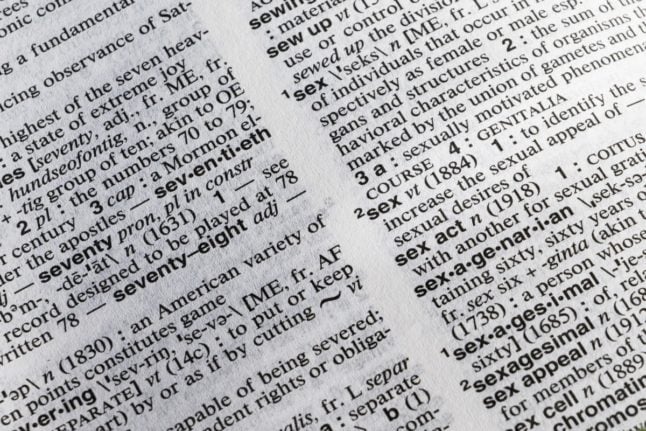From health passes to extended terraces, much of France in 2021 will be unrecognisable to somebody who last visited before the Covid pandemic.
But some things never change, like beaches, ice cream and the inevitable traffic jams in August. Here are the phrases you will need to navigate familiar and unknown territory in France this summer.
READ ALSO Where in France can you get away from the crowds this summer?
Pass sanitaire – Health passport. Large gatherings in France, including outdoor festivals, cruises and nightclubs, require you to show a health pass, proving that you have either been vaccinated, have recently tested negative for Covid, or have recovered from the virus. From July 21st, the pass will be required to access leisure venues hosting more than 50 people like cinemas and museums, and from August, this will be extended to cafés, restaurants, bars, trains and long-distance coaches. If unsure, you can ask, “Faut-il le pass sanitaire ?” (Do you need a health pass?), or check out The Local’s guide to the pass HERE.
Masque obligatoire – Mask required. In response to the threat posed by the delta variant of Covid, a number of mayors in popular tourist destinations including Nice and Saint-Malo have brought back mandatory mask wearing for certain streets. And you still need to wear a mask in many enclosed spaces like shops and public transportation – failure to do so can net you une amende de €135 – a €135 fine.
Jauge – Capacity. This word literally means “gauge”, but these days it’s commonly used to refer to capacity limits in venues. Since the beginning of July, bars, restaurants and cinemas no longer have to respect a particular jauge, and can welcome as many people as they like, but with case numbers rising in France, the government could choose to limit numbers again at any moment.
Centre de dépistage – Testing centre. Many countries, including the UK, USA and Canada, require their citizens to take a Covid test before travelling home after a holiday in France, even if they are fully vaccinated. You can take a PCR test at one of France’s many testing centres, or buy an antigen test from a pharmacy.
READ ALSO How tourists and visitors can get a Covid test in France
That’s enough about the health crisis now, although if you need them we do have vocabulary guides to getting a Covid test and for in case you fall ill.
Juilletiste / Aoûtiens – July / August holiday goers. As The Local explains, there is a traditional rivalry in France between those who go on holiday in July, and those who leave in August. Whether you’re a juilletiste or an aoûtien, be prepared to defend your choice!
Journée noire – Black day. This refers to a day when there are extreme amounts of traffic on France’s roads. There is often one samedi noir (black Saturday) per year when most people are either driving to their holiday destinations or returning home, often at the beginning of August, but there can be more than one in the same year. The term comes from the classification system used by national forecaster Bison Futé, which it is wise to check before setting off.
READ ALSO Seven French expressions to help you complain about the heat
Fête nationale – National Holiday. In English we refer to France’s national celebration on July 14th as Bastille Day, after the storming of the Bastille in 1789. But in France, they simply call it the fête nationale, or the quatorze juillet. It’s a big party every year, and a great event to take part in if you happen to be in France at the time.
Feu d’artifice – Fireworks. This is the highlight of every July 14th, as towns all over the country put on fireworks displays. They will be going ahead this year in most places, but check first whether you need the pass sanitaire.
Glace à l’italienne – Soft-serve ice cream. This is a hugely popular summer treat in France, sold by the beach, in ice cream shops, and often outside chocolate shops. But don’t be fooled – despite the name, it’s nothing like an Italian gelato. It’s actually a soft-serve ice cream, or a 99 if you’re from the UK.
Granité – Granita. This one is closer to its Italian counterpart, often referred to as a “slushy” in English. You’ll find stalls offering a large variety of flavours of this icy beverage, perfect for cooling down after a day spent in the sun.
Attraper un coup de soleil – To get sunburnt. Literally a “hit of sun“, hopefully you won’t be needing to use this one too often.
Le soleil tape fort – The sun is strong. You can tell the French are used to heatwaves, because this is another expression which imagines the sun is a boxer. Literally “the sun is hitting hard”, it shows a healthy respect for the destructive power of its rays.
Rester à l’ombre – To stay in the shade. If you’re not used to the heat, or if you’re feeling particularly pale after eighteen months of télétravail (remote working), this is probably a good idea.
Se (faire) dorer la pilule – To get a tan. Alternatively, you may want to wind down after the difficult time we’ve all been through by basking in the sun. In France, you can use this expression, which comes from the phrase dorer la pilule (to brown / sugarcoat the pill). That expression has the same origins as its English equivalent – the act of making medicine more appealing to swallow – and can also be used figuratively. But se dorer la pilule (to brown your pill) is a synonym for bronzer (to tan).
Barbeuc – Barbecue. Technically, the French word is the same as in English, but you’ll commonly hear people shorten it to barbeuc. It’s a popular summer activity in France, especially when combined with spicy merguez sausages, and with people looking to avoid large crowds, barbecues could become even more popular this year. “On fait un barbeuc demain ?” (“Should we have a BBQ tomorrow?”)
Manger en terrasse – To eat outside. With restaurants remaining open this summer, and with cities like Paris allowing them to extend their terraces into the street, eating outside is a great opportunity to breathe after a difficult year. When you request a table, the waiter might ask, “Vous préférez en salle ou en terrasse ?” (“Do you prefer inside or outside?”)



 Please whitelist us to continue reading.
Please whitelist us to continue reading.
Member comments